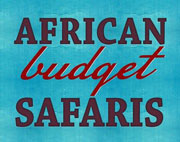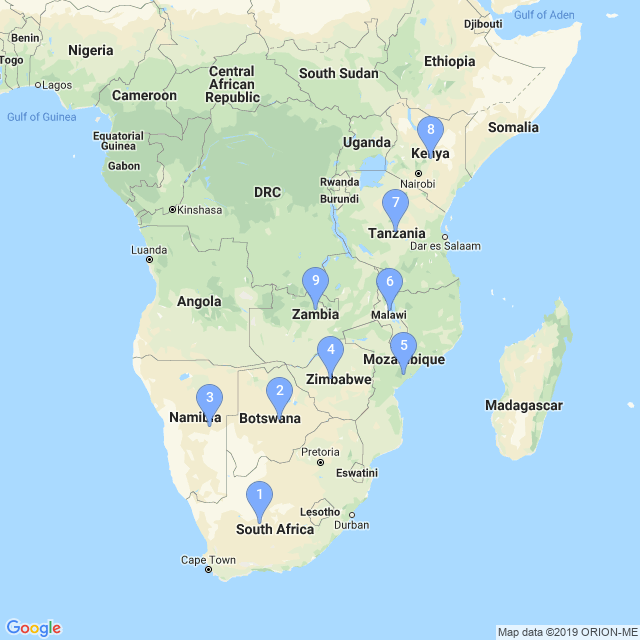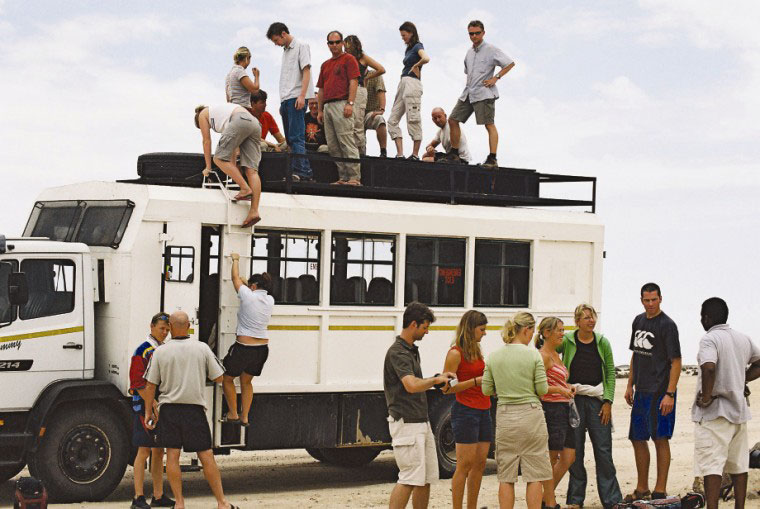Tipping on Safari: The Best African Safari Tipping Guide on Who & How to Tip
Navigating the intricacies of tipping on safari is an essential aspect of ensuring an enjoyable and gratifying experience for both travellers and the remarkable individuals who make these journeys possible. Safari tipping etiquette varies across cultures and destinations, and understanding how to express your appreciation in a manner that aligns with local customs and acknowledges the dedication of safari staff can greatly enhance your African safari adventure. This safari tipping guide offers comprehensive insights into the art of tipping on safari, providing you with practical advice to navigate this delicate yet meaningful aspect of your journey.
 Mokoro poler tipping by Kate
Mokoro poler tipping by Kate
| Tipping in Africa Quick Links |
|---|
 Budgeting and tipping on safari by epSos .de
Budgeting and tipping on safari by epSos .de
Tipping on Safari in Africa, What is the norm?
In Africa, tipping is the norm. In fact, tipping often contributes a significant portion of income to those working in the service industry. This blog hopes to present an even picture that looks at both sides of the tipping equation. That said, the golden rule should always be that tipping rewards excellent service and care that you receive during your Africa safari tour. You should never feel obliged to tip for poor service.
| INFO BOX: How Safari Staff See Tipping |
|---|
| The idea of tipping needs to be understood from two sides, the giver AND the receiver. To start with, all staff at safari lodges spend long stretches away from their families due to isolated locations, challenging transportation systems, and expensive transport. Secondly, being the breadwinner in African culture often comes with an unspoken social contract to support unemployed relatives or students, supply food, and look after parents. Finally, safari lodges are dynamic places set in wild spaces, that deal with all manner of logistical problems like providing clean water and electricity, and include dealing with wild animals. These factors lead to long work hours, often behind-the-scenes efforts, that ensure unseen challenges are managed, all so that guests can have a relaxing and problem-free safari experience. In addition to these factors, the safari industry operates within an already challenging socioeconomic environment, rampant poverty, and developing economies. Considering the substantial investment many guests make in their safari experience, the notion that a modest gratuity can not only support but make a big difference, to the broader welfare of workers and their communities may present a different perspective on the value of tipping on safari. |
 Hotel porter tips by Elvert Barnes
Hotel porter tips by Elvert Barnes
A Country-by-Country Breakdown of What Money is Accepted Where in Africa
The great thing about booking a safari tour in advance is that many of your large expenses like hotel accommodation, and transfers are paid for upfront. In addition to this, larger establishments will accept credit or debit cards, especially in major cities or tourism hot spots like Arusha, Cape Town, Zanzibar, and Victoria Falls.
However, having a small amount of money in small denominations of local currency will ensure a hassle-free and smooth tipping experience. Wherever you go, tipping should be done in small denominations of local currency which is good for people who do not have access to foreign exchange, as well as tourists who do not want to travel around with large amounts of cash.
While US dollars are often acceptable and viewed as universal, there are regional currency differences between East African countries like Kenya, and Tanzania, as well as Zimbabwe, and their southern counterparts, Botswana, South Africa, and Namibia.
Tipping on Safari in East African Countries
In East Africa, the US dollar is widely accepted. However, even here, local currency in smaller denominations is preferred by porters and service staff. This is because exchanging foreign currency may not be easy for some people working with smaller amounts, and will incur exchange fees. To get around this, we advise changing a small amount of money into the local currency and asking for it in small denominations.
East Africa Currency & US$ Value*
- Tanzanian & Zanzibar: Tanzania Shillings (TZS). US$ 1 = TZS 2.5
- Kenya: Kenyan Shilling (KES). US$ 1 = KES 144.5
- Rwanda: Rwandan Franc (RWF). US$ 1 = RWF 1.2
- Uganda: Ugandan Shilling (UGX). US$ 1 = UGX 3.7
*Exchange rates were accurate at the time of publishing on xe.com.
For larger tips, such as the tips for your tour guides and background staff tip jars, etc. US$ or local currency are both completely acceptable. When using US dollars, it is worth noting that you should bring those printed post-2008, and which are not old or torn, as these can be problematic. Furthermore, having access to smaller denominations, in an easily reachable place, for day-to-day expenses, means that you will not have to flash your cash by pulling out large wads of notes to pay for a beer, or provide a US$ 1 tip!
 Kili porters tipping by Class V
Kili porters tipping by Class V
Tipping on Safari in South Africa & Southern African Countries
Southern Africa is largely governed by the bloc's largest economy, South Africa. The value of the Eswatini Emalangeni, Lesotho Maloti, and Namibian Dollar are all pegged to the fortunes of the Rand (ZAR). In these countries, as well as parts of Mozambique, South African Rands (ZAR) are acceptable as tips.
Both Zimbabwe and Zambia favour the US dollar. While Zimbabwe is a special case because of internal turmoil, US dollars, and South African Rands are widely accepted and are legal tender. In Zambia, the preferred currency for tipping is the US dollar which is easily exchanged for Kwacha.
Botswana has perhaps the most stable currency in southern Africa, and when visiting Botswana, the Botswana Pula is the preferred currency.
Southern Africa Currency & US$ Exchange Value*
- South Africa: South African Rands (ZAR). US$ 1 = ZAR 18.8
- Botswana: Botswana Pula (BWP). US$ 1 = BWP 13.5
- Namibia: Namibian Dollars (NAD). US$ 1 = NAD 18.8
- Zambia: Zambian Kwacha (ZMK). US$ 1 = ZMK 19.4
- Zimbabwe: Zimbabwean Dollar (ZWD). US$ 1 = ZWD 361
*Exchange rates were accurate at the time of publishing on xe.com.
In Zimbabwe and Zambia, out of necessity, locals are always up to date with current conversion rates and are happy to receive US dollars.
In all southern African countries, tipping is the norm. As in East Africa, it is good practice to carry small denominations of US$, and/or small denominations of local currency. When taking part in an all-inclusive safari package, cash will be used for markets, the occasional local restaurant, curios, and tipping, which means that you do not need to carry large amounts of cash. When visiting South Africa, cash in ZAR is always available from ATMs and can be easily accessed when needed.
 Petrol pumps tips by DieselDemon
Petrol pumps tips by DieselDemon
A Note About Currency & Exchange Rates
Exchange rates are important when on safari, as favourable exchange rates mean excellent value against weaker currencies. A good way to get an idea of the value of the local currency is to visit a local grocery store and check the price of milk, bread, and soft drinks. This will give you a fair idea of the local currency value that you can check against exchange rates (see the latest ones at xe.com). Working with the exchange rate allows your budget to stretch a lot further, making both you and your suppliers happy.
| INFO BOX: Tipping from a traveller's Point of View |
|---|
| From the guests' perspective, US travellers who are accustomed to a tipping culture, often expect to tip, while travellers from Europe or Australia, are less tip-inclined, and can be uncertain about safari gratuity protocols. The idea of eliminating tipping and incorporating it into the final bill is challenging, and not always feasible, due to the various components of a safari. Some guests suggest that workers' salaries should cover expenses and that lodge owners should provide more. While these concepts are commendable, safari costs encompass various facets beyond wages. The lodges incur expenses such as concession fees, maintenance, and more. Many lodges strive to balance costs and fair compensation by implementing measures like solar power and self-sustaining practices. Often, safari lodges also provide housing, feeding, and caring for staff living on-site for extended periods, which contributes to a substantial owner expense. And, all of these need to balance providing the best price possible for patrons. While tipping is generally expected and budgeted for by most guests, it's important to underscore that gratuities remain entirely discretionary, based on the perceived level of service. |
 Tipping on safari, game rangers by Thomas Sly
Tipping on safari, game rangers by Thomas Sly
Who Should You Be Tipping on Safari?
Typically, gratuities are extended to staff members who might not hold 'professional' designations in the traditional sense, implying that they haven't necessarily undergone extensive higher education to secure specific roles. There are, however, specific exemptions, such as spa therapists or guides, who generally possess formal qualifications.
When on safari in Africa, the following professions are NOT usually tipped: lodge owners, managers at camps, lodges, hotels, or restaurants, pilots or cabin crew when flying, desk staff at airports, sales assistants in shops or tour centres, medical staff like paramedics, nurses, doctors, or evacuation crews.
The people who benefit the most from tips, and the ones who it is customary to tip as they are the invisible workers who take care of you are back house staff like cooks, gardeners, cleaners, and guards, as well as the front of house staff like guides and trackers, waiters, drivers, and spa therapists.
These people are specific to safari lodges and the safari lodge economies. Outside of these, in South Africa for example, there are petrol attendants and car guards, waiters and waitresses, as well as contracted tour guides. It is always good to go back to basics, good service should be rewarded, but you should never feel obligated to tip.
 Taxi tipping in Africa by Stockographie
Taxi tipping in Africa by Stockographie
-
How to Go About Tipping on Safari in Africa
Navigating tipping practices during a safari can be confusing as there is no standardised approach (hence this easy African safari tipping guide).
Each camp or lodge operates on its own tipping system, which requires a bit of manoeuvring. For clarification, you can always approach the manager of the lodge who will be more than happy to advise you on their specific tipping guidelines. Generally, however, the following methods are commonly employed:
-
The Communal Tip Box
Usually situated at a central point (like a tip jar in a restaurant), which is convenient and unobtrusive, guests can simply place their tip into a securely locked box. Occasionally, distinct boxes are designated for front- and back-of-house staff, trackers, and guides. The manager is responsible for tallying the tips and distributing them equitably amongst the staff. The benefit of the Tip Box strategy is that eliminates awkwardness that can result from handing over money from person to person, as well as maintaining privacy for guests.
 Curios, keepsakes, safari budget extras
Curios, keepsakes, safari budget extras
-
Direct to Manager
Managers are the captains of the safari ship. In some cases, handing tips to them on departure effectively takes the who and how questions out of your hands and gives the responsibility to the manager. Some guests will specify for whom and why the tip has been given, while others leave it to the discretion of the manager. This is an acceptable, and common practice.
-
Direct to Staff Tipping
Direct tipping poses pros and cons. On the one hand, if you have received outstanding service from an individual and want the personal gratification of rewarding this service personally, then this is the way to go. On the other hand, it opens the gate for selective tipping where other staff who do not have the opportunity for one-on-one contact, may miss out. In addition to this, it also exposes the amount of money that comes from the guest. It may be that it is better to balance your strategy by doing both, tipping general staff and then giving a special bonus if you feel it is warranted. Either way, this should only be done when you leave, and try to be discreet.
-
Leaving Cash on the Bed When You Leave
DO NOT LEAVE CASH ON THE BED WHEN YOU LEAVE. While this may seem discreet and like a nice surprise for staff, safari staff, when finding cash will likely assume that it has been forgotten and radio the driver or guide to return. Honesty is a key pillar in remote locations, and staff are trained to hand over any items left in rooms to the lodge manager.
-
Credit or Debit Card Tips
While the cash-less approach is ideal, it is a very limited option as very few lodges have credit card facilities due to the often exorbitant surcharges. If your lodge does have credit card facilities, communicate directly with the manager, and make sure the gratuity amount is clearly stated on the receipt. If you are short of cash for a generous tip, this can be a good option.
 Parking tips by Brandon
Parking tips by Brandon
When Should You Be Tipping on Safari?
To keep things simple, the basic rule is to tip at the end of your meal, lodge stay, or game drive. For example, if you are staying for three nights at a single lodge, that includes multiple game drives with the same guide, tip when you depart for your next destination. If your accommodation outsources your activity, then tip at the conclusion of the experience. The same applies to your restaurant experiences, if it is in-house, tip at the end, if it is a once-off, then add the gratuity to the bill. The best-case scenario is to provide a single tip at the culmination of your stay at each lodge, camp, or hotel.
Your safari guide will not anticipate a gratuity after every individual activity or even at the end of each day. Adopting such a practice might inadvertently place pressure on a guide to tailor their performance to the guest offering the tip, potentially disrupting the harmonious relationship between the guide and all guests. Furthermore, it could create an uncomfortable situation for your fellow guests if you were consistently offering tips while they chose not to.
How Much Should You Be Tipping on Safari?
There are many factors that influence how much to tip on an African safari. The level of service experienced, your individual financial constraints, your personal philosophy on gratuities, as well as the dynamics of your group, and safari package. The guiding principle remains to contribute as generously as feasible when the occasion arises, but be cognizant of the fact that there is both too much and too little. A trained guide or ranger, for example, should always receive more than a cleaner because their skills and training should be rewarded. If porters were to get larger tips than rangers, then porting would be incentivized over conservation. Aim to be both generous and fair.
Regardless of the amount you decide upon, there's no need to express apologies for it. Simply offer the tip in the manner you prefer and express your gratitude sincerely. The staff members always warmly receive gestures of appreciation, acknowledgement, and thankfulness. Now, what is the appropriate tip for a Kenya safari? How much should you consider tipping on a safari in Tanzania? What's the suitable amount for a safari butler?
 Hotel tipping by John Stavely
Hotel tipping by John Stavely
| Here is a general reference for tipping while on safari. This is a general guide and can, and should be adjusted according to your personal safari budget. |
|---|
|
 Bar tipping by Tyrone Adams
Bar tipping by Tyrone Adams
Safari Tipping Guide: 6 Tips For Tipping on a Budget Safari
Here are six easy-to-follow steps to use as a safari tipping guide when planning your African budget safari:
Check your itinerary thoroughly and anticipate when, where, and who you may need to tip. For example, the transfer from the hotel to the lodge, a tip for the waitress at dinner, or the services of the safari guide and tracker. Then, decide on the basic amount you feel comfortable giving, and make note of these small amounts throughout your trip.
Once you have anticipated all the tipping throughout your trip, organize your expenditure into sections; for example airport and hotel day 1, safari lodge days 2 & 3, Zanzibar bungalow days 4 & 5 etc. Then, for each leg of your journey, label envelopes that will hold the assigned tips. Doing this will streamline the process and make it easy to manage the tips throughout your safari adventure.
When getting currency, either local or US$, be sure to get small denominations, eg. US$ 1, US$ 5, US$ 10, & US$ 20 dollar bills. Small denominations are easier to manage, separate, and hand over, and will not require establishments to scramble for change. Using US$ 50 or US$ 100 notes, in addition to the inconvenience, can make you a target for criminals. In many countries, while US$ can be used to pay for things, change will be given in the local currency. Carrying small denominations of US$ will save you leaving Botswana for example, with a surplus of Pula that you can’t use.
In most East and southern African countries, you will need to carry cash with you. South Africa is the only country where you can reliably withdraw cash from ATMs on a regular basis, which removes the need to forward plan for tipping on safari. For all other African safari destinations, it's advisable to carry cash with you. When using ATMs in South Africa, be safety conscious and follow a few safety rules like never accepting help from strangers and avoiding distractions, it often helps to have a friend with you at the ATM, and if you are a solo traveller and feel unsafe, seek help from a bank employee.
Carrying cash does come with risk. When staying at a hotel or lodge, use the in-room safe, or enquire with the manager of the establishment about using their safe room for both money and passports. Most safaris will go off without any problems, and this should be seen as a precaution and not a necessity.
In Africa, the US Dollar is king. Most African safari destinations, outside of South Africa, readily accept the US Dollar, particularly in regions like Zimbabwe and Victoria Falls. Opting for the US Dollar streamlines transactions, especially when traversing borders or engaging in a multi-destination safari, thus avoiding the complexities of flipping between local currencies.
 Safari guides get you the ultimate shots
Safari guides get you the ultimate shots
Embarking on an African safari means meeting a host of individuals who contribute to the success of your journey. The dedicated lodge staff ensuring your comfort, the diligent cleaners maintaining a pristine environment, the skilled drivers navigating the wilderness with expertise, and the insightful trackers and guides who steer you through the wild African bush, all contribute to an unforgettable African adventure. Tipping, in the context of this remarkable ensemble, is a simple gesture that can have a profound effect on their lives.
There you have it, our complete African safari tipping guide. If you have any questions or want to start planning your African safari adventure today - contact African Budget Safaris.
If you liked this post, these trips cover similar ground…
- Big 5 Cape Town Safari to Aquila Game Reserve - Budget Day Tour
- 8 Day Kenya Family Safari to Masai Mara Lodge & More
- 7 Day Fly-In Botswana Safari - Delta & Chobe Tented Camps
- 11 Day Budget Kenya & Tanzania Family Safari
- 4 Day Budget Kruger Safari to Klaserie Reserve Lodge







 On the outskirts of Marloth Nature Reserve, Andrew can be found walking and swimming in the beautiful Langeburg Mountains. He is passionate about animals, birds, reptiles, and plants and loves nothing more than an adventure in nature. An established artist with a master's in English literature, Andrew has traveled far and wide but South Africa still has his heart.
On the outskirts of Marloth Nature Reserve, Andrew can be found walking and swimming in the beautiful Langeburg Mountains. He is passionate about animals, birds, reptiles, and plants and loves nothing more than an adventure in nature. An established artist with a master's in English literature, Andrew has traveled far and wide but South Africa still has his heart.





 Want to know how many people will be on your overland safari with you? Compare the group sizes of Overland Africa Safaris and see the main differences between overlanding safaris big and small.
Want to know how many people will be on your overland safari with you? Compare the group sizes of Overland Africa Safaris and see the main differences between overlanding safaris big and small.





